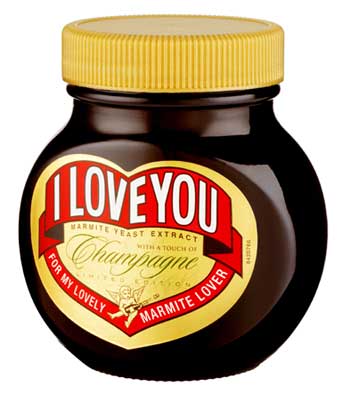
This jar of marmite yeast extract spread loves you. It also points out that part of being in love is expressing it physically...
We here at Combat! blog have criticized the trend reporting at the New York Times in the past, but all is forgiven with today’s fascinating piece about marketers’ rampant use of the word “love.” Okay, not all is forgiven—we’re still pissed about their expose on the horrors of the Park Slope Food co-op—but at least this one has some verifiable information. It turns out that the Times is at its best when it’s writing about advertising, and advertising is at its best when it’s convincing you that the most profound human emotional experience can be replicated by using a Blackberry. Car manufacturers seem to be the biggest purveyors of sweet nothings, here, with Honda, Subaru and Nissan all launching love-oriented ad campaigns in the last two years. The notion of people loving their cars is nothing new. Your car represents freedom, self-sufficiency, responsibility and socio-economic status, as anyone without a car will tell you. Anyone without a girlfriend will make a similar argument, so the connection between cars and love seems obvious—especially if you are dead inside. Consider the rationale offered by Michael Kuremsky, Vice President and Global Brand Franchise Leader at Olay: “We view Olay as a partner alongside women, so the emotional connection is Olay validating to a woman that we want to help her achieve her best skin, to get to a place where she loves her skin.” Tonight, darling, I will take you on a carriage ride around Central Park and validate that I want to partner alongside you in achieving your best handjob, ever.
Remember when Nike came out with that “Revolution” shoe commercial in 1987, and everyone was scandalized that they had cheapened a John Lennon song? How far we have come. The concept of love has become increasingly central to the commodified elements of our culture—movies, pop music, the beauty/clothing/pharmaceutical industries—even as it becomes more elusive in our inner lives. Is it merely a coincidence that the generation that popularized “All You Need Is Love” in 1967 also popularized divorce for the next thirty years, only to wind up using the Beatles song in a Blackberry commercial? Any women’s studies, history or English major will tell you that the idea of romantic love amounts to a historical fad, having only really taken hold in the Victorian era. Before that, all you needed was a significant dowry and proof of your intact hymen, plus the agreement of both families. Is it any wonder, then, that our generation sometimes questions what love is, exactly? On one hand, it’s the second most popular character motivation in movies and television—after a bomb hidden somewhere in the city—and, weirdly, cell phone ads. On the other hand, it’s the thing our parents legally argued that they failed to achieve, plus probably the reason we got such bad grades our sophomore year in college, and—now that we’re 32 and working from home and rapidly losing our once thick, lustrous hair—maybe the false object that has sabotaged our relationships with women up to this point. To quote Def Leppard, love bites.
If we accept the two-pronged thesis that love is A) ubiquitous in the world of commercial entertainment and B) increasingly absent from, or at least suspect in, our personal lives, it’s not surprising that it should be employed as a tool of salesmanship. In an economy where pretty much all of our survival-level needs are met, the association between consumer luxuries and sublime emotions—emotions we desperately want to achieve—is inevitable. That doesn’t make it right, of course. A man who actually loved his Subaru would be the object of pity and/or terrified disgust; such a person resembles less a hip, active thirtysomething and more Gollum from Lord of the Rings. When we are asked to believe that emotions like avarice, convenience-seeking and pride of ownership are actually species of love, the concepts of real love—filial, platonic, erotic—are necessarily cheapened. Do yourself a favor and check out the Amazon consumer reviews of the Verizon Droid, in which one K. Amundsen claims that “overall I love my droid more than my kids, more than my husband, more than my Nikon D300.” Do you feel cold, sickening horror? That probably means you still have hope.
Last night I happened to watch the first episode of the MTV reality series Jersey Shore. Early in the episode, Snookie—I initially typed “the Snookie character” before I realized that she is a real person, kind of—points at each of her roommates in turn, saying, “I love you…I love you…” until she has worked her way around the kitchen. These are people she has met four hours ago. Clearly, she is someone to whom the word “love” means something different and weird, and perhaps that meaning is more akin to what we mean we say we love our Macbooks or the Green Bay Packers or “Hey Ya!”. It’s a shame that we’ve chosen for that emotion the same word we regularly apply to our spouses, parents and children. What’s really terrifying, though, is that we might be describing the same thing.




I was able to marry despite the fact that my hymen was not intact. We had to up the dowry, however, to THREE bottles of Jose Cuervo.
I’m not sure if you failed to make a point here, or if you made a point and I blocked it. In the last two years I haven’t registered emotions beyond “hungry” and “sticky”.
http://mc374ll.info/
Enjoyed reading/following your page.Please keep it coming. Cheers!